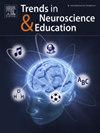Do neuroscience knowledge and attitudes differ across pre-service and in-service teacher groups? Evidence from teacher education programs in China
IF 3
Q2 NEUROSCIENCES
引用次数: 0
Abstract
Teacher neuroscience knowledge has gained global attention. This study comparatively examined the neuroscience knowledge and attitudes of diverse pre-service and in-service teacher groups among 436 Chinese educators (180 pre-service and 256 in-service teachers) participating in diverse teacher education programs across China. Key findings indicate that: (1) Chinese teachers generally hold positive attitudes towards neuroscience and its educational applications, but had limited neuroscience knowledge, with in-service teachers showing more pronounced limitations. (2) In-service teachers critically lacked systematic opportunities to acquire neuroscience knowledge, primarily relying on informal media channels which posed risks. (3) Higher general brain knowledge positively predicted stronger neuromyth beliefs among pre-service teachers. Other influencing factors on knowledge and attitudes varied distinctly between the groups. These findings suggest the more structured neuroscience education in teacher training programs.
在职前和在职教师群体中,神经科学知识和态度是否有所不同?来自中国教师教育项目的证据
教师的神经科学知识得到了全球的关注。本研究对436名中国教育工作者(180名职前教师和256名在职教师)参加全国不同教师教育项目的不同职前和在职教师群体的神经科学知识和态度进行了比较研究。主要研究结果表明:(1)中国教师对神经科学及其教育应用普遍持积极态度,但对神经科学知识的掌握程度有限,在职教师的局限性更为明显。(2)在职教师严重缺乏系统的神经科学知识获取机会,主要依赖非正式媒体渠道,存在风险。(3)职前教师较高的一般脑知识正向预测较强的神经神话信念。其他影响知识和态度的因素在两组之间差异很大。这些发现表明,在教师培训计划中,更有条理的神经科学教育。
本文章由计算机程序翻译,如有差异,请以英文原文为准。
求助全文
约1分钟内获得全文
求助全文
来源期刊

Trends in Neuroscience and Education
NEUROSCIENCES-
CiteScore
6.30
自引率
6.10%
发文量
22
审稿时长
65 days
 求助内容:
求助内容: 应助结果提醒方式:
应助结果提醒方式:


